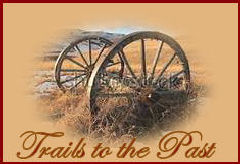|
Progressive Men
Index
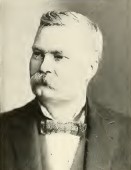 ARMSTRONG TAYLOR is a member of the
Minneapolis bar, and a gentleman who honors the
profession of which he is a member. He is a son of John
Taylor and Sarah Dowler (Taylor), and grew up on a farm
in northern Vermont, where his parents lived, in very
moderate circumstances. His ancestors were
Scotch and English, who emigrated to the north of
Ireland at the time of William of Orange. His family
came to this country in 1839. ARMSTRONG TAYLOR is a member of the
Minneapolis bar, and a gentleman who honors the
profession of which he is a member. He is a son of John
Taylor and Sarah Dowler (Taylor), and grew up on a farm
in northern Vermont, where his parents lived, in very
moderate circumstances. His ancestors were
Scotch and English, who emigrated to the north of
Ireland at the time of William of Orange. His family
came to this country in 1839.
The subject of this sketch was born at Berkshire,
Vermont, November 17, 1850. While yet a
young lad Armstrong Taylor valued the advantages of
education, and determined to obtain such schooling as he
could bring within his reach. He attended the district
schools of the neighborhood and maintained himself by
doing chores for his board. He has no college education,
but good academic training. Continued his studies while
working as a farmer in summer and teaching school in the
winter. At the age of twenty-one he began the study of
law at Richford, Vermont, with Hartson F. Woodard, and
afterwards studied in the office of Davis & Adams,
at St. Albans, Vermont, where he was admitted to the bar
on June 28, 1875. Taylor immediately removed to
Wisconsin and commenced the practice of his profession
at Baldwin, St. Croix County. He continued in the
practice of law there for twelve years, when he removed
to Minneapolis, locating in this city March 27,
1887. He
has continued in the practice of law with eminent
success before all the courts of this state. Mr. Taylor has
always been a Republican, and cast his first vote for
Grant for “four years more” in 1872. Was appointed by
the governor of Wisconsin as county attorney of St.
Croix County in 1883. He refused the
nomination to the same office at the next election,
preferring general practice. He is a member of the
Commercial Club of Minneapolis and several Masonic
lodges. His church connections are with the Episcopal
society. He was married in June, 1876, to Julia Noyes,
of Richford, Vermont, but they have no children. Mr. Taylor takes
great pride in his profession and enjoys the esteem and
confidence of his clients and
friends.
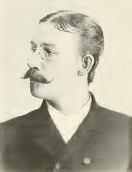 GUSTAV THEDEN On the twelfth day of November,
1862 Gustav Theden was born at Nor Vermland,
Sweden. He
was educated in the schools of his native country, and
graduated from Karlstad College in 1880. Shortly after
taking his degree he emigrated to the United States,
settling in Chicago, where he became editor of Missions
Vannin, a position which he held for eight years, when
he came to Minneapolis, since his home. Since his
residence in Minneapolis, Mr. Theden has been editor of
the Minneapolis Veckoblad, a religious and political
newspaper in Swedish, having a circulation of about
fourteen thousand.
He is now one of the proprietors of that
paper. He has a good understanding of military tactics,
having had a cartful training along this line in the
mother country. He is a member of the Swedish Mission
Covenant Church, and is unmarried. GUSTAV THEDEN On the twelfth day of November,
1862 Gustav Theden was born at Nor Vermland,
Sweden. He
was educated in the schools of his native country, and
graduated from Karlstad College in 1880. Shortly after
taking his degree he emigrated to the United States,
settling in Chicago, where he became editor of Missions
Vannin, a position which he held for eight years, when
he came to Minneapolis, since his home. Since his
residence in Minneapolis, Mr. Theden has been editor of
the Minneapolis Veckoblad, a religious and political
newspaper in Swedish, having a circulation of about
fourteen thousand.
He is now one of the proprietors of that
paper. He has a good understanding of military tactics,
having had a cartful training along this line in the
mother country. He is a member of the Swedish Mission
Covenant Church, and is unmarried.
It was in the campaign of 1892 that Mr. Theden
first made himself felt in politics. He was engaged
by the Republican State Central Committee to make a
number of speeches in the Swedish tongue at various
points over the state. Having studied
law with a marked degree of success, and having many of
the arts and graces of the public speaker, he made a
reputation in that campaign which two years later
secured him the nomination as a candidate for the state
senate from one of the Minneapolis districts. He was
elected by a large majority, and his term of office will
not expire until the first of January, 1899. During his first
term as member of the state senate he became known as
the champion of measures designed to benefit labor,
notably the lien law, which owes its present efficiency
in this state in large part to his efforts. He was also
backed legislation intended to give voice to the demand
for additional safeguards to be thrown around the liquor
traffic. His chief work as a temperance reformer is
embodied in a bill nullifying an ordinance of the city
of Minneapolis providing that only members of the police
department should be qualified to swear out warrants for
a violation of the Sunday closing law, so called. At the opening
of the present session of the legislature (in January,
1897), he became the champion of that large and growing
class of citizens who believe that the modern department
stores are against public policy. He moved the committee
of investigation that was busy for a large part of the
session sifting out the facts connected with that system
and was made its chairman. Mr. Theden is a striking
representative of the successful young man in politics,
and his career so far has been an honorable one. He enjoys the
confidence of a rapidly widening circle of acquaintances
and friends, and his future is very
promising.
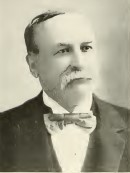 J. H.
THOMPSON is one of the pioneer settlers of Minneapolis,
having been engaged in business in that city for over
forty years as a merchant tailor and dealer in gents’
furnishing goods. He was born in South Berwick, Maine,
August 17, 1834, the son of Daniel G. Thompson and Dorca
Allen Hayes (Thompson.) His father was a well-to-do
farmer in the state of Maine. In September, 1843, the
family removed from South Berwick to a farm in North
Yarmouth, Maine, where the subject of this sketch worked
on the farm and attended the country school until he was
fifteen years of age. J. H.
THOMPSON is one of the pioneer settlers of Minneapolis,
having been engaged in business in that city for over
forty years as a merchant tailor and dealer in gents’
furnishing goods. He was born in South Berwick, Maine,
August 17, 1834, the son of Daniel G. Thompson and Dorca
Allen Hayes (Thompson.) His father was a well-to-do
farmer in the state of Maine. In September, 1843, the
family removed from South Berwick to a farm in North
Yarmouth, Maine, where the subject of this sketch worked
on the farm and attended the country school until he was
fifteen years of age.
He was then engaged as a clerk in
George S. Farnsworth’s store at North Bridgton, Maine. A
year later, in March, 1850, he commenced to learn the
tailor’s trade with Nathaniel Osgood. He here attended
the North Bridgton Academy in the winter of 1851.
In July, 1853, he removed to Augusta, Maine, and
was employed as a clerk and cutter by Richard Bosworth.
In March, 1853, he was employed in the same capacity by
J. H. and F. W. Chisam, of the same city. In the winter
of 1856 he came West, looking over several locations in
order to find a suitable location to open business,
finally deciding to try what was then St. Anthony. He
started in the tailoring business in this town in the
winter of 1856-57, being the first tailor in
Minneapolis. He has continued in the same line of
business ever since and has enjoyed a large and
profitable trade. In connection with his tailoring
business he had for years the first express office in
Minneapolis, and also sold the first railroad tickets to
the East via steamboats and by rail from Prairie du
Chien, Wisconsin.
In August, 1862, he was a volunteer
in Captain Anson Northrup’s company for the relief of
the threatened settlers at Fort Ridgely. He is a
Republican in politics and takes an active part in party
affairs. He served as supervisor of the town of
Minneapolis for several years, and also as alderman. In
the fall of 1856, when only twenty-one years of age, he
took considerable interest in the election of John C.
Fremont, Republican candidate for president. In
September of the same year he was elected and took the
three degrees in Ancient Free and Accepted Masonry, in
Bethlehem Lodge, No. 35, jurisdiction of Maine. In
November of the same year he was elected Senior Deacon
of the lodge. He has held several
other offices in the Masonic fraternity, more especially
that of the grand treasurers office consecutively for
the past nineteen years. On September 18, 1860, he was
married to Miss Ellen M. Gould, at Minneapolis, and has
two children living.
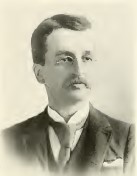 CHARLES JOHN
TRYON is a lawyer practicing his profession in
Minneapolis. He is descended from old Colonial stock.
His father, A. D. Tryon, of Batavia,
Genesee County, New York, was in active business as
druggist and bookseller in that place for about
thirty-five years, and in fairly comfortable
circumstances for the greater part of that period. After
closing out his business he made Western investments at
Spokane Falls, which, however, have not proven very
profitable. He was an enthusiastic supporter of
Republican principles, being repeatedly chairman of
county committees, but has never held any office. He was
born in Montgomery County, New York, in 1824, and is
still living. His wife, Amanda Hatch Shepard (Tryon) was
born in the first log house built in her town in Genesee
County, New York, removing to Batavia shortly after
marriage. William Tryon, great-grandfather of the
subject of this sketch, was born and lived in early life
in Connecticut, and was among the New England levies who
took part in the campaign ending in Burgoyne’s
surrender. His son, John Tryon, grandfather of Charles,
served in the militia in the war of 1812. They and their
ancestors were all farmers living in Connecticut, in the
vicinity of Wethersfield, for many generations, being
descended from William Tryon who came from England in
1640 and settled in Connecticut. The paternal
grandmother of Charles was of pure French blood, of
Huguenot stock, her family having settled in Connecticut
during the Revolutionary period. The grandfather of the
subject of this sketch on his mother’s side was a
physician and farmer, being one of the first settlers in
the western part of Genesee County, New York, having
come overland with his wife from Vermont, where both
were born. They were connected
with the Phelps and Graham families of that state. CHARLES JOHN
TRYON is a lawyer practicing his profession in
Minneapolis. He is descended from old Colonial stock.
His father, A. D. Tryon, of Batavia,
Genesee County, New York, was in active business as
druggist and bookseller in that place for about
thirty-five years, and in fairly comfortable
circumstances for the greater part of that period. After
closing out his business he made Western investments at
Spokane Falls, which, however, have not proven very
profitable. He was an enthusiastic supporter of
Republican principles, being repeatedly chairman of
county committees, but has never held any office. He was
born in Montgomery County, New York, in 1824, and is
still living. His wife, Amanda Hatch Shepard (Tryon) was
born in the first log house built in her town in Genesee
County, New York, removing to Batavia shortly after
marriage. William Tryon, great-grandfather of the
subject of this sketch, was born and lived in early life
in Connecticut, and was among the New England levies who
took part in the campaign ending in Burgoyne’s
surrender. His son, John Tryon, grandfather of Charles,
served in the militia in the war of 1812. They and their
ancestors were all farmers living in Connecticut, in the
vicinity of Wethersfield, for many generations, being
descended from William Tryon who came from England in
1640 and settled in Connecticut. The paternal
grandmother of Charles was of pure French blood, of
Huguenot stock, her family having settled in Connecticut
during the Revolutionary period. The grandfather of the
subject of this sketch on his mother’s side was a
physician and farmer, being one of the first settlers in
the western part of Genesee County, New York, having
come overland with his wife from Vermont, where both
were born. They were connected
with the Phelps and Graham families of that state.
Charles John Tryon was born at
Batavia, Genesee County, New York, September 8, 1859. He
was educated at the Batavia Union school, which was then
as now under the control of the regents of the
University of New York, and which was superior to the
ordinary academy of today. He was compelled, however, to
leave school at the age of fifteen to aid in support of
the family, after the business collapse of 1873. He
worked as a clerk in his father’s store for four years,
when, having procured a clerkship in the first auditor’s
office in the treasury department, he left for
Washington in 1878. He held this position until April,
1886, when he came West and located at Minneapolis.
He had commenced the study of law before going to
Washington, and continued its study while in that city.
He received the degree of LL. B.
from the law school of the National University,
and LL. B. at the Columbian Law School. On his arrival
at Minneapolis he entered the law office of Kitchel,
Cohen & Shaw. Shortly afterwards he was made
examiner for the Minnesota Title Insurance and Trust
Company, was soon made assistant counsel, and in
October, 1892, was made counsel of the company. In the
fall of 1895, retaining his position as counsel for the
trust company, he opened offices for general law
practice, giving special attention, however, to real
estate, corporation and insurance law. Mr.
Tryon is also a director of and attorney for the
Northern Standard Telephone Company. In politics Mr.
Tryon has always been a supporter of the Republican
party, but has held no political offices.
He is a member of the Minneapolis
Commercial Club, and of the Plymouth Congregational
church. June 10, 1891 he was married to Miss Isabel
Gale, daughter of Mr. and Mrs.
Harlow A. Gale. Mr. and Mrs. Tryon have three
children, Frederick Gale, Elizabeth Gale and Phillip Van
Dorn.
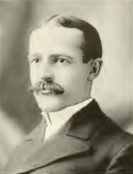 CHARLES A. TULLER The patronymic of the
family of which the subject of this sketch is a member
was originally spelled Tullar. The spelling was changed
by Artemidorous Tuller, grandfather of Charles, who
thought it was easier to write “e” instead of “a.” In an
old deed, signed by him in 1804, however, he spelled his
name “Tullar,” and it is also noted that in an old
contract, which was signed in 1820 by two members of the
family this same difference of spelling occurs.
Artemidorous Tuller, who was of old New England stock,
was a mechanic by profession, and possessed considerable
inventive genius. The first crooked ax helve turned out
was made by him. His son, Hiram Whiting Tuller, father
of Charles A., was born at Lower Sandusky, Ohio, in
1824. When he was but eight years of age the family
moved to Jonesville, Michigan. He still resides there,
the oldest pioneer living in that locality. In business
life he has been quite active, and attained a
comfortable affluence as a contractor and builder.
During the Civil War he held a clerkship in the war
department at Washington, under General Meigs, and also
shouldered a musket at the time General Early attempted
to take Washington. He has always taken a prominent
place in the community in which he lives, and has
occupied many township and village offices. He was also
a clerk of the state senate in the session of 1865 and
1867. Clara
E. Nimocks, his wife, was a native of New York. She was
born at Houseville, in Lewis County, November 1, 1827,
of English descent. CHARLES A. TULLER The patronymic of the
family of which the subject of this sketch is a member
was originally spelled Tullar. The spelling was changed
by Artemidorous Tuller, grandfather of Charles, who
thought it was easier to write “e” instead of “a.” In an
old deed, signed by him in 1804, however, he spelled his
name “Tullar,” and it is also noted that in an old
contract, which was signed in 1820 by two members of the
family this same difference of spelling occurs.
Artemidorous Tuller, who was of old New England stock,
was a mechanic by profession, and possessed considerable
inventive genius. The first crooked ax helve turned out
was made by him. His son, Hiram Whiting Tuller, father
of Charles A., was born at Lower Sandusky, Ohio, in
1824. When he was but eight years of age the family
moved to Jonesville, Michigan. He still resides there,
the oldest pioneer living in that locality. In business
life he has been quite active, and attained a
comfortable affluence as a contractor and builder.
During the Civil War he held a clerkship in the war
department at Washington, under General Meigs, and also
shouldered a musket at the time General Early attempted
to take Washington. He has always taken a prominent
place in the community in which he lives, and has
occupied many township and village offices. He was also
a clerk of the state senate in the session of 1865 and
1867. Clara
E. Nimocks, his wife, was a native of New York. She was
born at Houseville, in Lewis County, November 1, 1827,
of English descent.
Their son Charles first saw life at
Jonesville, Michigan, June 26, 1866. The lad’s education
was received in the graded and. high schools of his
native town. He graduated from the latter in his
eighteenth year and at once engaged in active business
life. The first dollar he earned was by acting as agent
for the Detroit Evening News, carrying the papers every
morning. He was at the same time also working in the
post office of his native village, holding the position
of assistant postmaster. In August, 1885, in response to
a telegram from Charles A. Nimocks, then manager of The
Minneapolis Journal, he came West to take a position as
collector with that paper in Minneapolis. This position
he held until January 1, 1889, at which time he was
promoted to the position of bookkeeper, to fill a
vacancy caused by the resignation of the lady who had
filled that position. In March, 1890, he was promoted to
the position of cashier of The Minneapolis Journal, and
still later, in January 1895, to that of assistant
manager. Industry, perseverance and model habits are the
qualities which have enabled Mr. Tuller to rise to the
responsible position he now fills. He is a conscientious
and hard worker, and a shrewd and conservative manager
of the responsibilities devolving upon him. He is a
member of the Royal Arcanum, and is an attendant of the
Episcopal church. He was married June 7, 1893 to Mary E.
Thompson, of Minneapolis.
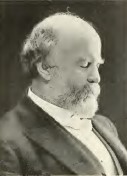 JAMES H. TUTTLE
Rev. James H. Tuttle, D. D., was born at Salisbury,
Herkimer County, New York, July 27, 1824. In his youth
he attended for a while the academy at Fairfield, New
York, and afterwards spent two years in Clinton Liberal
Institute.
Plans were formed for attending Harvard
University, but they were never carried out. All his
life Dr. Tuttle has been a diligent and faithful student
and a great traveler. Few men are better informed upon
all subjects or can put their knowledge into more
attractive form or employ it for more practical
purposes. He was brought up in a Baptist family, but
when quite young his religious views changed and he
became a Universalist. Soon after this change took place
he decided to enter the ministry. His first settlement
was at Richfield Springs, New York when he was but
twenty years of age. The next one at Fulton, Oswego
County, in the same state, where, in 1848 he married
Miss Harriet E. Merriman. Of this union two sons were
born. The mother died in Dresden, Germany, where she had
gone, hoping to recover health and strength. Her death
occurred in 1873. In 1886 the elder son, James, passed
away in his early manhood. He was a man of sterling
worth, spotless integrity and great business
ability—universally honored. The younger son, George H.,
is one of the most prominent of the younger surgeons in
New York City. JAMES H. TUTTLE
Rev. James H. Tuttle, D. D., was born at Salisbury,
Herkimer County, New York, July 27, 1824. In his youth
he attended for a while the academy at Fairfield, New
York, and afterwards spent two years in Clinton Liberal
Institute.
Plans were formed for attending Harvard
University, but they were never carried out. All his
life Dr. Tuttle has been a diligent and faithful student
and a great traveler. Few men are better informed upon
all subjects or can put their knowledge into more
attractive form or employ it for more practical
purposes. He was brought up in a Baptist family, but
when quite young his religious views changed and he
became a Universalist. Soon after this change took place
he decided to enter the ministry. His first settlement
was at Richfield Springs, New York when he was but
twenty years of age. The next one at Fulton, Oswego
County, in the same state, where, in 1848 he married
Miss Harriet E. Merriman. Of this union two sons were
born. The mother died in Dresden, Germany, where she had
gone, hoping to recover health and strength. Her death
occurred in 1873. In 1886 the elder son, James, passed
away in his early manhood. He was a man of sterling
worth, spotless integrity and great business
ability—universally honored. The younger son, George H.,
is one of the most prominent of the younger surgeons in
New York City.
The subject of this sketch remained at Fulton
until 1853, when he was called to Rochester, New York.
The success of his ministry in the two smaller fields he
had cultivated, made the larger church, in the more
important place, feel sure that he who had been so
“faithful over a few things,” was qualified for greater
responsibilities. These hopes were not in vain. His
ministry increased in excellence and power. In 1859 he
removed to Chicago, taking the pastorate of the Second
Universalist Church, which rapidly grew in numbers and
influence under his ministry. In 1866 a few Universalist
families in Minneapolis were worshipping in Harrison’s
Hall, while their first meeting-house was being erected.
Dr. Tuttle came up from Chicago to preach before the
Universalist convention of the state. The trustees of
the new society invited him to bring his family, spend
the summer vacation at Minneapolis, and preach for them
on Sunday. He came and the summer lengthened into a
pastorate of a quarter of a century. “I have had five
pastorates in all,” he says, “and my last three
pastorates cover thirty eight years. No minister has
been more fortunate in the gift of noble, generous
parishes. Half a century! What changes have happened
during this period! A majority of the world’s greatest
inventions date within it. Compare our whole country,
our Northwest especially, today with what they were
fifty years ago. What revolutions, and what progress m
religious thought have everywhere occurred in this space
of time!” The Church of the Redeemer grew, under his
pastorate, with the growth of the city, from a handful
of worshippers to a large and powerful
congregation.
In 1801, having
completed his twenty-fifth year of service, he retired
from active work, and his associate. Rev. Marion D,
Shutter, was chosen pastor, The title of Pastor Emeritus
for life was conferred upon Dr. Tuttle. The completion
of his twenty-fifth year in the pastorate was
pu1>lich’ celebrated—representatives of all
denominations in the city taking part. Mr. Tuttle’s life
is interwoven with the history of the city. No man
stands higher than he in the estimation of the
community. He has been prominent in all good works,
identified with all charitable and humane enterprises,
and always upon the side of rational reforms. His
influence has extended far beyond this city, and in
neighboring towns and states he has been widely sought
fur the lecture platform as well as for the pulpit. He
is known and loved by people of all religious beliefs
and of no religious belief—by all who recognize the
supremacy of character.
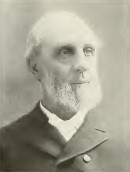 CHARLES EDWIN VANDERBERGH has had
the distinguished honor of having served on the bench in
the district court and the supreme court continuously
for a period of thirty-four years. His ancestors came
from Amsterdam, Holland, and settled in New York more
than a generation before the French and Indian war. His
grandfather was a soldier in the Revolution and removed
soon after the war to Saratoga County, New York, where
his father, Stephen Vanderburgh, was born in 1800. CHARLES EDWIN VANDERBERGH has had
the distinguished honor of having served on the bench in
the district court and the supreme court continuously
for a period of thirty-four years. His ancestors came
from Amsterdam, Holland, and settled in New York more
than a generation before the French and Indian war. His
grandfather was a soldier in the Revolution and removed
soon after the war to Saratoga County, New York, where
his father, Stephen Vanderburgh, was born in 1800.
Charles Edwin was born at Cliffton Park, Saratoga
County, New York, December 2, 1829. In 1837 the
family located in Onondaga County, in the same state,
where Charles Edwin worked on his father’s farm during
the summer months and attended the district school
during the winter until he was fifteen years old, when
he prepared for college at Courtland College, Homer, New
York. In 1849 he was admitted to the sophomore class at
Yale College, and was graduated in the class of 1852. He
then became principal of the academy at Oxford, New
York, and in connection with his duties as principal
took up the study of law.
He was admitted to the bar in 1855, and the next
year removed to Minnesota, where in April he located at
the then little village at the Falls of St. Anthony. His
first employment was in the office of the register of
deeds, where he worked about three weeks, earning about
forty dollars in preparing the records of the county. He
then formed a law partnership with F. R. E. Cornell,
which became one of the leading law firms of the new
state. In 1859 Mr. Vanderburgh was elected judge of the
Fourth judicial district, and held that position for
over twenty-two years. He discharged the duties of the
office with singular ability and fidelity, a statement
which is fully substantiated by his long retention on
the bench. His careful legal training, his habits of
patience and thorough investigation led him to sound
conclusions, and his decisions were very seldom
reversed. In 1881 there was a vacancy on the bench of
the supreme court of the state, caused by the death of
Judge Cornell, and Judge Vanderburgh was chosen to fill
it. He served in that capacity with distinction and
honor until the end of 1893. In 1860 while judge of the
district court, he rendered a decision which brought him
into national prominence. A slave woman,
Eliza Winston, then owned by Colonel Christmas, of
Mississippi, brought to Minneapolis by her master on a
visit, was taken before Judge Vanderburgh on a writ of
habeas corpus. The judge declared “That slavery was a
local institution, and that a slave brought into a free
state by its owner became free.” He decided that the
woman was free to choose whether to remain with her
former owners or to leave them. She chose to do the
latter, and aided by a party of abolitionists, and in
spite of protests and an attempt to resort to force, was
enabled to make her escape to Canada.
In his political associations Judge
Vanderburgh has always been a Republican, but, naturally
and properly, by reason of his judicial position, has
never been a strong partisan. He is an elder in the
First Presbyterian Church of Minneapolis; was for many
years superintendent of the Sabbath School, and is
active in philanthropic and religious effort. He was
married September 2, 1857, at Oxford, New York, to Julia
M. Mygatt, daughter of William Mygatt. She died in 1863,
leaving two children, William Henry and Julia M. In 1873
Judge Vanderburgh was married to Anna, daughter of John
Culbert, of Fulton County, New York. Of this union was
born one daughter, Isabella, who died in 1893, a young
lady of great promise. Although Judge Vanderburgh has
devoted forty busy years of his life to the discharge of
public duties of great responsibility and honor, he is
still, in 1896, although in his sixty-sixth year, a hale
and strong man in the full possession of all his
faculties and in the enjoyment of the high esteem and
sincere respect of his fellow citizens, who honor him
for the service he has
rendered.
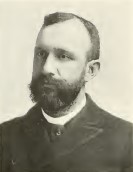 CHARLES
WHITE VAN TUYL The name at the head of this sketch
indicates at once that the subject of it is of Dutch
descent. The Van Tuyls were originally natives of
Holland, where the name was spelled van Tuyll, and the
full family name there at present is van Tuyll van
Serooskerken. The family is of Frisian origin, and Tuyll
was the name of a small town in that province. The
American branch descends from several brothers who came
to America about 1720 and has been chiefly farmers. The
ancestor of the subject of this sketch settled in the
Mohawk Valley, New York, where his father, Ebenezer Van
Tuyl, was born. Ebenezer has been engaged in railroad
business for many years, his present official position
being that of manager of the Western Car Service
Association at Omaha. He was a soldier in the union army
captain of Company G, First New York Infantry, and
served in that capacity two years. His service included
the Peninsular campaign and he was also at Fortress
Monroe during the historic combat between the Monitor
and Merrimac. He was wounded and taken prisoner at
Chancellorsville, which closed his military career. On
his mother’s side, Charles Van Tuyl’s ancestry is
Scotch-Irish. They were early settlers in Central New
York and engaged in farming. CHARLES
WHITE VAN TUYL The name at the head of this sketch
indicates at once that the subject of it is of Dutch
descent. The Van Tuyls were originally natives of
Holland, where the name was spelled van Tuyll, and the
full family name there at present is van Tuyll van
Serooskerken. The family is of Frisian origin, and Tuyll
was the name of a small town in that province. The
American branch descends from several brothers who came
to America about 1720 and has been chiefly farmers. The
ancestor of the subject of this sketch settled in the
Mohawk Valley, New York, where his father, Ebenezer Van
Tuyl, was born. Ebenezer has been engaged in railroad
business for many years, his present official position
being that of manager of the Western Car Service
Association at Omaha. He was a soldier in the union army
captain of Company G, First New York Infantry, and
served in that capacity two years. His service included
the Peninsular campaign and he was also at Fortress
Monroe during the historic combat between the Monitor
and Merrimac. He was wounded and taken prisoner at
Chancellorsville, which closed his military career. On
his mother’s side, Charles Van Tuyl’s ancestry is
Scotch-Irish. They were early settlers in Central New
York and engaged in farming.
The subject of this sketch was born December 17,
1859, in Addison, Steuben County, New York. He attended
the public schools in Hornellsville, the country
district school in Tioga County, and the graded and high
schools in Binghamton, all in New York. The Binghamton
schools were of high rank and were the most valuable
educational facilities which he ever enjoyed. Mr. Van
Tuyls first employment was in the service of the United
States Express Company at Binghamton, in 1875. He was
afterwards clerk with the New York, Lake Erie &
Western Railway at Binghamton, but in March, 1882,
removed to Omaha, where in the following September he
entered the service of the Union Pacific, and was
employed in the freight auditor’s office. He remained in
this office, being promoted step by step to the chief
clerk of the claim department, until October, 1886, when
he was appointed assistant freight claim agent in charge
of the territory west of Granger, Wyoming. During this
time he resided in Salt Lake City, and continued there
until December 1, 1887. Then there occurred one of the
periodical changes of management to which the Union
Pacific has been subject, and Mr. Van Tuyl’s office was
abolished with scores of others, and he returned to
Omaha and was again employed in the general
offices.
Subsequently he was again appointed chief clerk
in the freight claim department, which position he
resigned in December, 1892, and engaged in the life
insurance business as special agent at Omaha for the
Northwestern Mutual of
Milwaukee.
That position he resigned in October, 1893, to
come to Minnesota to take the position which he now
holds, that of general agent of the State Mutual Life
Assurance Company, of Worcester, Massachusetts, at
Minneapolis. He has been successful here, as the records
of the company’s business will show, notwithstanding the
business depression. Mr. Van Tuyl contributed an essay
in June, 1894, on the value of the Life Underwriters’
Association, to the underwriters’ national convention at
Chicago, and was so fortunate as to secure the prize
offered for the best production. The prize consists of a
year’s custody of the loving cup, which is annually the
subject of like contest by the representatives of the
local associations of the United States. In the
following December Mr. Van Tuyl was elected president of
the Minnesota Association and served a year in that
capacity, declining reelection on account of the
pressure of private business, but has since been elected
president of the Minneapolis Association, which position
he now holds. He is a Republican in politics. His father
voted for Fremont, and was a conductor on the famous
underground railroad.
Mr. Van Tuyl is a member of the Commercial Club,
and of the Westminster Presbyterian Church, and is a
director in the Y. M. C. A. He was married in September,
1889, to Katharine J. Bingham, of Northfield Minnesota.
He formed her acquaintance in Salt Lake City, where she
was preceptress of the Presbyterian Collegiate
Institute.
They have three children, Ruth, Hugh Oliver and
Ray Whittier.
The information
on Trails to the Past © Copyright
may be used in personal family history research, with
source citation. The pages in entirety may not be
duplicated for publication in any fashion without the
permission of the owner. Commercial use of any material
on this site is not permitted. Please respect the
wishes of those who have contributed their time and
efforts to make this free site possible.~Thank
you! | | | |
